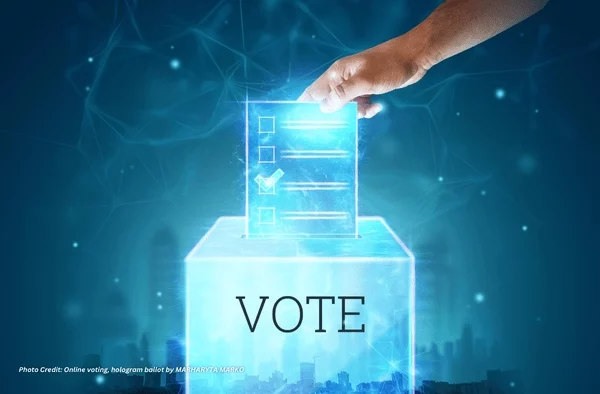Electoral commissioner to boost digital election transparency
Share

Sven Bluemmel, the Victorian Electoral Commissioner, urgently appeals for clarity on the application of artificial intelligence (AI) in the upcoming local council elections, emphasising the necessity for proper labelling and accountability. Bluemmel insists that political campaigns must distinctly mark all AI-generated or AI-altered content. This ensures voters stay informed about the origin and credibility of the information they encounter.
Bluemmel stressed the importance of transparent campaign practices, emphasising that voters must differentiate between human-generated content and AI-generated content to make well-informed decisions. He noted, “Getting campaign information to voters is an essential part of the robust contest of ideas in any election. We know that voters are concerned about misinformation and disinformation.” Voters must access accurate and dependable information to guide their decision-making process regarding their voting choices.
The Commission stresses the importance of transparency in AI, pointing out concerns that AI-generated disinformation may threaten the integrity of elections. The Commission actively protects public confidence in the electoral process amid a landscape filled with misinformation and disinformation. Bluemmel reiterated, “Tackling political mis- and disinformation is essential if we are to protect voter confidence in our electoral system. It is the responsibility of all participants, not just the VEC, to maintain that confidence.”
Safeguarding voter trust
- Clear labeling of AI-Generated content: Bluemmel urged all political campaigns to clearly mark materials altered or created by AI, in addition to the current requirements for authorisation statements. This labelling helps voters recognise how AI tools influence the messages they see, which aids in preventing manipulation or deception.
- Meeting community expectations: Bluemmel focused on the need to adhere to legal standards and meet public demands for transparency, asserting that ethical practices in campaigning preserve trust. He warned that if candidates and political groups do not follow these standards voluntarily, they could jeopardise voter confidence and threaten the integrity of the democratic process.
- Self-regulation in a legal grey area: Bluemmel underscored the importance of self-regulation among campaigners, despite the lack of laws governing truth in political advertising in Victoria. He urged voters to think critically when examining election materials. He recommended verifying information by seeking authorisation statements and consulting reliable sources such as the Victorian Electoral Commission’s website.
The Commissioner’s remarks illustrate the broader implications for digital governance and public sector transparency. AI increasingly integrates into governmental operations, from local elections to national campaigns. Bluemmel’s appeal emphasises the need to supervise AI use in order to protect democracy’s integrity. Without a clear legal framework governing AI in campaign practices, he advocates for transparency, showing how public institutions must adapt to the challenges posed by emerging technologies.
Strengthening digital governance
AI’s incorporation into election campaigns transforms how elections function. Bluemmel demonstrates how transparency promotes government accountability, which is critical for maintaining fair and accurate elections and supporting the integrity of digital government initiatives. He advocates for transparency measures that protect against the potential misuse of AI to influence public opinion, a growing concern as technology continues to intertwine with governance.
These transparency initiatives will likely impact public confidence in digital systems, shaping future regulatory structures for AI applications in elections and other areas of public sector operations. Bluemmel emphasises the need to tackle AI governance by combining regulation and public awareness to uphold the integrity of democratic processes.
The Victorian Electoral Commissioner calls for clarity on the use of AI in local council elections, marking an important shift in how the public sector addresses AI oversight. Bluemmel stated, “I encourage all voters to think critically about what you see and hear in these local council elections. I also call on campaigners to be responsible and ensure any AI-generated or AI-modified election campaign material is properly authorised and visibly labelled.” The outlined measures protect both voters and the integrity of the democratic framework from potential threats posed by AI-generated political misinformation.
Public Spectrum is the first knowledge-sharing platform in Australia to embrace the entire public sector. This website is a platform where you can connect, collaborate, empower, inspire, and upskill with public sector professionals.










Today’s Pick
11th Annual Aus Goverment Data Summit
April 1, 2025
7th Annual NZ Government Data Summit
May 7, 2025
3rd Public Sector Comms Week
May 14, 2025
Subscribe
We send emails,
but we do not spam
Join our mailing list to be on the front lines of healthcare , get exclusive content, and promos.
AI appointment Australia Australian boost boosts business businesses covid-19 cyber cyber attack cybersecurity cyber security data data breach data management defence Digital employment enhance enhances fraud funding governance government grants infrastructure Innovation Lockdown management new zealand NSW NZ online privacy public Public Sector queensland renewable energy scams security Social Media Technology telecommunications victoria
-

Understanding and building your digital strategy
Digital Government, Opinion
-

Featured Leader: Jamie Morse on multi-channel strategies for communication
Communications, Featured Leader
-

Featured Leader: Tegan Tembe of NSW Treasury on creating solid planning strategies and processes
Featured Leader
-

Wirraka Maya Health Service improves patient care with My Health Record
Learning
Show More-

Effects of ineffective communication in the workplace
Communications, Personal Development
-

7 ways you can enhance your personal development skills
News, Personal Development
-

5 advantages of working in the public sector
News, Personal Development, Professional Development
-

7 causes of communication issues in the workplace
Communications, News, Personal Development
Show MoreLast Viewed